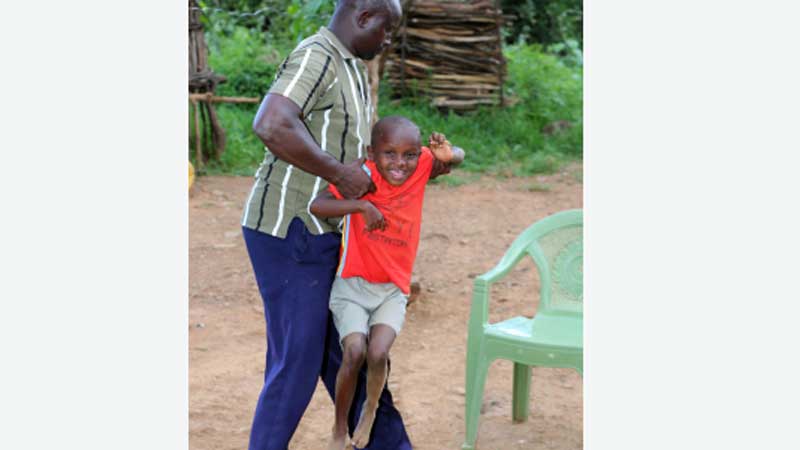
At the tender age of seven, Chepchirchir Kiplagat cannot walk, talk and has developed hearing impairment.
Kiplagat, a resident of Emsos village, Mogotio sub-county in Baringo, is a victim of a venomous snake bite that left her paralysed.
She smiles shyly as she wistfully watches other children her age play at their compound, but cannot join them.
Kiplagat's paralysis is attributed to failure to access medical attention on time, despite Government initiative of leasing digital machines to counties to boost health services.
Her father Jackson Chepkui said when his daughter was bitten on June 18, 2015, he rushed her to Marigat Hospital, but there were no antivenin and they were referred to Kabarnet Hospital.
At the facility, her swollen right arm was operated on but her condition did not improve. She required specialised care but lack of an operational Intensive Care Unit (ICU) further sent the girl to Moi Teaching and Referral Hospital (MTRH).
Medical report
According to medical report, the girl was admitted to ICU with a compartment syndrome, renal failure and cellulitis.
Kiplagat is not alone. Her struggles to get prompt medical care highlight the challenges faced by most patients in the country amid government plan of providing universal health, thanks to failure by respective counties to install leased digital medical machines and lack of experts.
The equipment acquired at Sh4.5 billion under the Medical Leasing Equipment Scheme (MLES) were to diagnose diseases and offer treatment like Intensive Care Unit (ICU), life support, dialysis, X-ray among other specialised diagnoses.
Baringo County received the machines that were installed at Eldama Ravine Sub-county Hospital and Kabarnet County Hospital.
However, Baringo patients seeking specialised care are still referred to Moi Teaching and Referral Hospital in Eldoret and Rift Valley Provincial General Hospital in Nakuru for lack of a functional ICU and experts.
No oxygen
Although an ICU wing is built at the facility in Baringo, it lacks oxygen to make it operational.
According to county Health Executive Mary Panga, lack of funds has been a major issue in installation and use of the digital machines.
And in some departments like radiology which is operational, there are no specialised doctors to interpret images.
Asked why the county has not hired trained medics to bridge the gap, she said they were working within a limited budget.
“Staffing is low, but we are working together with doctors from MRTH and private facilities at the radiology department. The medics interpret tests made on patients,” said Panga.
Modern equipment installed at Kabarnet Hospital include the CT scan, dialysis machine, X-ray and imaging, including life supporting machines at the ICU.
In Kericho, the machines were installed at the county hospital after its renovation. Installed machines include radiology, renal unit, ICU and modern laboratory.
The radiology department faces the same challenges as in Baringo. There are no doctors to read images, according to Knun representative Laban Kipyego.
The CT scan machines are also lying in a store as the county has not constructed an installation room.
Currently, patients seeking for the services are referred to Kapkatet private hospital with severe cases referred to Malik Clinic in Nakuru, MTRH or PGH in Nakuru.
“There are CT scan machines, but they are locked up as we wait for construction of installation room,” said the medic.
Despite the ICU being operational, he says there is shortage of nurses.
Though the hospital has a full-fledged radiology department, there are no specialist doctors, and sometimes tele-medicine is done, with some cases being taken to Sinendet Private Hospital.
The situation is the same in Bomet where ICU is not functional. Medics instead use High Dependency Unit (HDU) that was launched last month. There are only two nurses trained on intensive care currently running the UHD.
According to nurses representative Vincent Rono, for smooth operation, the unit requires at a group of least six nurses, with each team working on a shift of eight hours.
Despite installation of the machines, majority of patients still seek services at Tenwek Mission Hospital.
Patients in need of CT scan are also referred to MTRH and the mission hospital.
Officer in charge at Nakuru Level Five Hospital Dr Joseph Mburu said services had improved following installation of the machines.
Jessy Kimenjo, a patient with kidney ailment, said he was satisfied by the care he was receiving at the hospital.
However, he explained that despite leasing of the machines, the national government did not bring in new staff to handle the machines. The management is currently forced to hire short-term contractors for smooth service delivery.
 The Standard Group Plc is a multi-media organization with investments in media
platforms spanning newspaper print
operations, television, radio broadcasting, digital and online services. The
Standard Group is recognized as a
leading multi-media house in Kenya with a key influence in matters of national
and international interest.
The Standard Group Plc is a multi-media organization with investments in media
platforms spanning newspaper print
operations, television, radio broadcasting, digital and online services. The
Standard Group is recognized as a
leading multi-media house in Kenya with a key influence in matters of national
and international interest.











